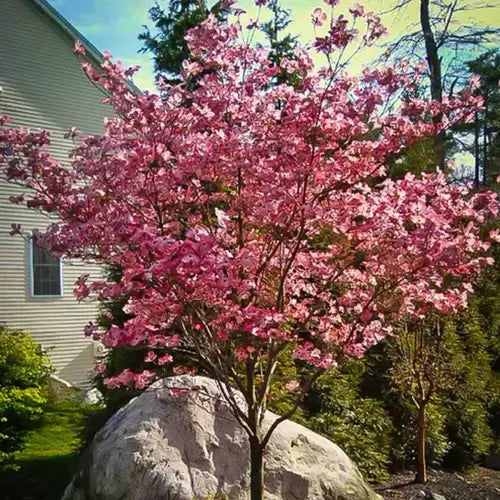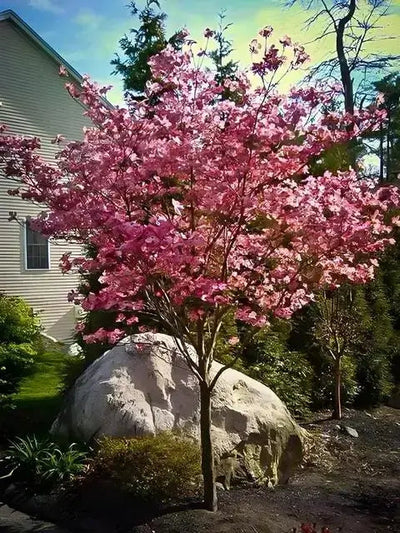Flowering Dogwood Trees For Sale
The dogwood tree, also referred to as dogwood arbor in the Latin language, is a small ornamental tree that blooms in early spring, lasting throughout the entire summer months and into fall. The dogwood flowers come in various colors, including pink dogwood, red dogwood, kousa dogwood, yellow, white dogwood with red tips, red dogwood with white tips, and solid white dogwood. Because of their beauty and their long-lasting blooms, dogwood trees are often used in landscaping for both homes and businesses, but flowering dogwood trees growing in the wild are more often than not breathtakingly beautiful.
When the blooming season has passed, and the weather begins to cool, the dogwood tree leaves will change color, and its pedals will all fall to the ground. Then tiny red berries will grow in their place for the birds and squirrels to enjoy until old man winter comes around and takes them all away in preparation for a new year to begin. The dogwood's natural lifespan is around eighty years; the standard height is about thirty feet, but they have been known to grow as tall as thirty feet.
Different Varieties of Dogwood Trees Include:
Red dogwood
Satomi Dogwood
Kousa dogwood
Cherokee dogwood
Where and How Do the Dogwoods Grow?
Native to North America the flowering dogwood grows best in zones 1 through 9, covering the entire United States, Europe, and Asia. Dogwoods are hardy trees that grow in many different types of soil, but they grow best in moist and well-drained soil. Dogwood trees can grow in shady areas or under full sun.
The Uses of The Dogwood Tree
The bark from the dogwood tree was often made into tea and used to treat fevers, boiled to make a lovely red dye for clothing and blankets, and even smoked during certain ceremonies conducted by the Indians.
Myths and Legends of Flowering dogwood Trees
Some myths and legends have been associated with the dogwood tree. One is that a murdered Indian princess used the pedals of a dogwood tree to stop the bleeding when she was murdered by an Indian Brave who wouldn't take no for an answer.
Another legend about the dogwood is that there was a time when the dogwood tree grew straight and tall until it was used as the wood for Jesus's cross. At that time, Jesus was said to have cursed the dogwood so it would never grow straight or tall again.
The dogwood tree, also referred to as dogwood arbor in the Latin language, is a small ornamental tree that blooms in early spring, lasting throughout the entire summer months and into fall. The dogwood flowers come in various colors, including pink dogwood, red dogwood, kousa dogwood, yellow, white dogwood with red tips, red dogwood with white tips, and solid white dogwood. Because of their beauty and their long-lasting blooms, dogwood trees are often used in landscaping for both homes and businesses, but flowering dogwood trees growing in the wild are more often than not breathtakingly beautiful.
When the blooming season has passed, and the weather begins to cool, the red dogwood tree leaves will change color, and its pedals will all fall to the ground. Then tiny red berries will grow in their place for the birds and squirrels to enjoy until old man winter comes around and takes them all away in preparation for a new year to begin. The dogwood's natural lifespan is around eighty years; the average height is about thirty feet, but they have been known to grow as tall as thirty feet.

